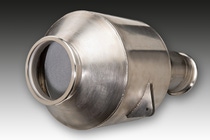Media
BASF updates the Abbreviated Component Maintenance Manuals for its Deoxo™ ozone and ozone/VOC converter portfolios
- BASF Deoxo™ ozone and ozone/VOC converters catalytically remove ozone and certain odorous volatile organic compounds (VOCs) to deliver quality cabin air compliant with government regulations
- The updated BASF Abbreviated Component Maintenance Manuals (ACMMs) redefine the test procedures and service methods for maintaining the converters
- The converters are rotable parts and must be properly tested and maintained to ensure reliable performance
BASF announced today that it has updated its Abbreviated Component Maintenance Manuals (ACMMs) for the Deoxo™ ozone converters and ozone/VOC converters portfolio, with the release of revised ACMMs for the Airbus A320 airplane platform and the Airbus A330/A340 airplane platform. The updated ACMMs redefine the test procedures and service methods for maintaining the converters, to ensure continued industry-leading performance of its ozone converters. Proper testing includes functional checks of both ozone conversion efficiency and pressure drop for air transiting through the converter. BASF encourages airline operators to check with their current MRO (Maintenance Repair and Overhaul) service provider to ensure compliance with the updated ACMMs.
During flight, airplanes at high altitudes are exposed to significant levels of ambient ozone. If unabated, the ambient ozone enters the aircraft cabin through the air conditioning ducts. Prolonged exposure to ozone at concentrations typical of these altitudes is known to cause adverse health effects including headaches, fatigue, shortness of breath, chest pains, coughing, and irritation of the eyes, nose or throat.
During ground and taxiing operations, odorous VOCs can enter the aircraft cabin through the bleed air system. These VOCs may include exhaust fumes from jet engines on neighboring airplanes, exhaust fumes from airplane service vehicles and de-icing fluids. Engine oil and hydraulic fluids may also leak into the bleed air system. These odorous VOCs may result in crew and passenger discomfort or even alarm, precipitating aircraft diversions and delays.
BASF’s Deoxo™ ozone/VOC dual function converters catalytically remove ozone and certain odorous VOCs to deliver better quality cabin air. They are available for factory installation on new airplanes or as a field retrofit for airplanes already in service that either don’t have an ozone converter or would benefit from the performance upgrade from an existing Deoxo™ ozone converter.
BASF is the leading supplier of proven ozone and ozone/VOC catalytic converter technologies addressing the needs of aircraft OEMs to achieve compliant and comfortable cabin air quality for crew and passengers. We pioneered the first ozone converter over 30 years ago, and our ozone/VOC dual-function converter has been used on aircraft for over 15 years.
At BASF we create chemistry for a sustainable future and develop innovative solutions that ensure the long-term success of our customers.
Deoxo is a trademark of BASF
Receive up-to-date news releases from BASF via push notification on your smartphone. Register for our news service at basf.com/pushnews.
About BASF’s Catalysts division
BASF’s Catalysts division is the world’s leading supplier of environmental and process catalysts. The group offers exceptional expertise in the development of technologies that protect the air we breathe, produce the fuels that power our world and ensure efficient production of a wide variety of chemicals, plastics and other products, including advanced battery materials. By leveraging our industry-leading R&D platforms, passion for innovation and deep knowledge of precious and base metals, BASF’s Catalysts division develops unique, proprietary solutions that drive customer success. Further information on BASF’s Catalysts division is available on the Internet at www.catalysts.basf.com.
About BASF
At BASF, we create chemistry for a sustainable future. We combine economic success with environmental protection and social responsibility. More than 117,000 employees in the BASF Group work on contributing to the success of our customers in nearly all sectors and almost every country in the world. Our portfolio is organized into six segments: Chemicals, Materials, Industrial Solutions, Surface Technologies, Nutrition & Care and Agricultural Solutions. BASF generated sales of €59 billion in 2019. BASF shares are traded on the stock exchange in Frankfurt (BAS) and as American Depositary Receipts (BASFY) in the U.S. Further information at www.basf.com.
P-20-184


